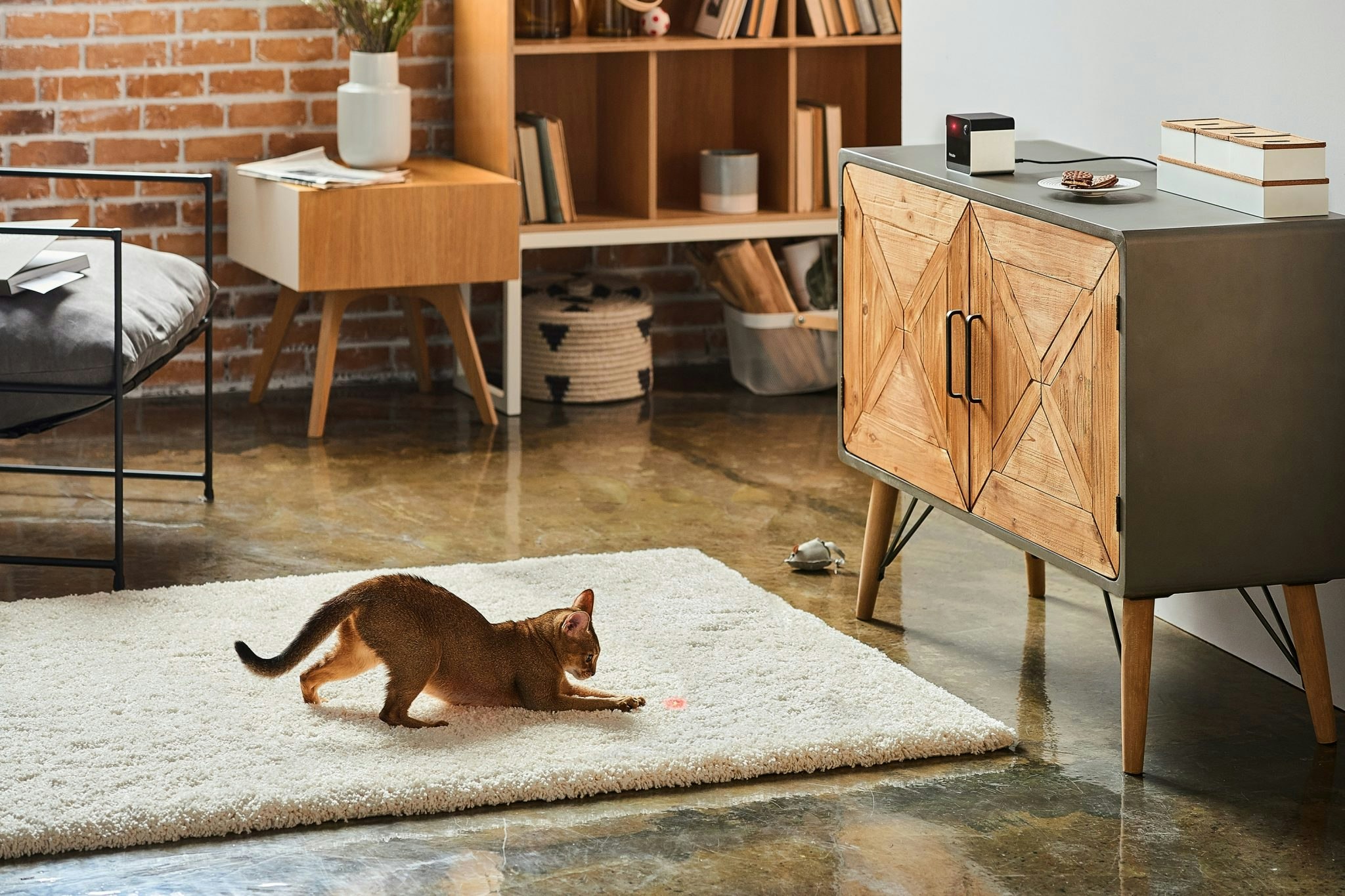What if your pet had its own smartphone and could call you? Maybe not literally an iPhone 12 but some video interface it could use to alert you? And what if you could more easily understand what your dog or cat wanted to tell you when it called?
Yaroslav Azhnyuk, chief executive and cofounder of Petcube is being serious. Petcube may have started out as cute video devices that allowed you to keep an eye on your dog while you are at work, but it has a bigger mission.
“We want to connect pets to the internet and give them a voice,” he says. “In the next five years I believe we will be able to make pets speak to us, to understand how they feel and talk to them through messenger services.”
Understanding animal consciousness is the AI project of the decade.
Petcube already allows you to video-call your dog or cat, play with it by moving a laser pointer and even dispense treats to it. But the company is working on better ways of using AI to understand patterns of barking or movement in order to let owners understand their pet’s state of mind. Petcube bought Canadian rival PetBot in 2017 in order to acquire more AI capability in this field.
“I am surprised at how much ethological research is out there — the study of animal behaviour — that is completely under-used,” says Azhnyuk.
At the moment the AI monitoring is used mainly for Petcube’s virtual pet-sitting functions, where the device can alert an owner if unusual levels of barking or movement are detected. But in due course, Azhnyuk is hoping there will be much fuller communication. Imagine if pets had the technology to order their own food, for example, he says. Might they make completely different food choices to what we expect? There is an endless amount we could learn about pets with the right technology.
“Understanding animal consciousness is the AI project of the decade,” says Azhnyuk.

How it started
Petcube was one of the first of the recent crop of pet technology companies. It was started in 2012 by three 20-something Ukrainian friends. The company’s CTO, Alex, had been tinkering around to create a two-way pet camera and a remotely controlled laser pointer, to help keep his needy and anxious black chihuahua, Rocky, from driving his neighbours mad with barking while he was at work.
The trio thought there might be a market for pet tech.
In 2012 the majority of people were starting to get smartphones and we started thinking about what a smartphone for pets would look like.
“There was no major brand that was tech-first at the time. Mark Andreesen wrote in his famous essay in 2011 that software would eat the world, but it hadn’t even begun to nibble at the pet world,” says Azhnyuk.
“In 2012 the majority of people were starting to get smartphones and we started thinking about what a smartphone for pets would look like.”

Petcube ran a Kickstarter campaign to help pull some initial money together. Then they joined the HAX programme run by venture capital company SOSV in Shenzhen, which teaches fledgeling hardware companies how to find and work with Chinese manufacturers.
The team moved to San Francisco in 2014 to focus on selling to the US market and went through the Y-Combinator programme, which Azhnyuk said was helpful for both connections and for teaching them how to be more effective entrepreneurs.
“A graveyard of hardware”
The company was soon selling tens of thousands of devices both online and through mainstream stores such as Nordstrom and Macy’s. Raising VC money, however, was difficult, says Azhnyuk. The company eventually raised a $25m Series A round in 2017 and 2018, but it was hard work.
Azhnyuk estimates he spoke to some 600 VC investors in the previous two years, doing 6-7 meetings a day.
It wasn’t a great time to be raising money for a hardware company. The internet of things hype cycle had peaked in 2014 —- Google had bought Nest for $3.2bn — but Petcube had failed to leap on the funding bandwagon quickly enough. By 2015/6 investors were getting disillusioned and had realised that people were not going to spend quite as much as expected on smart home gadgets.
There are 100 more ways to die as a hardware company.
“It was a graveyard of hardware,” says Azhnyuk. “Every other week I would see a company I knew go bankrupt.”
Hardware companies are notoriously risker to start than software ones. You need to pre-pay for manufacturing and every time you upgrade or fix a bug it costs you money.
If Azhnyuk has one bit of advice for a first-time entrepreneur wanting to start a hardware company it is: don’t.
“Do something like a Saas software company first, he says. There are 100 more ways to die as a hardware company and the potential for scaling lower,” he says.
That said, if you are successful with hardware the rewards can be amazing. Hardware has longer retention rates — and it is worth remembering that two of the world’s most valuable tech company — Apple and Tesla — are hardware companies.

What’s next?
Having launched three devices onto the market — Petcube Bites which dispenses treats, Petcube Play which lets you play with your pet with a laser pointer, and the budget option of the plain Petcube Cam — the company is focusing on software and services.
“Once everyone has one of these devices, you need to think about what kinds of apps they need,” says Azhnyuk.
Once everyone has one of these devices, you need to think about what kinds of apps they need.
Some of the services currently on officer include shared access to the Petcube so different family members can look in on a pet, and the Petcube Care subscription programme that acts as a virtual petsitter detecting anything unusual.
Earlier this year they launched a way to connect to certified vets through the camera.
The company sells almost exclusively online now, having concluded that doing business with brick and mortar stores like Macy’s was too costly.
“To have great sales in a brick and mortar store you need to get a really prominent spot. We were competing against companies like Google and Amazon and it was hard to compete with their budgets.”
Petcube had already withdrawn from bricks and mortar stores before Covid-19 hit, a move that now looks very prescient. It sells mostly through Amazon, Walmart.com and Chewy.com, the online pet supplies store.
The next move is likely to be a return to the European market. Petcube did some sales in the UK early in its lifespan but pulled out to focus on the US. Now, says Azhnyuk, the time might be right to come back. There is no fundraising imminent — the company is self-sustaining now and doesn’t need to raise to survive. Still, watch this space, as a move back to Europe might take a little extra firepower.
This article first appeared in our monthly Unleashed Pet Tech newsletter, a collaboration with Purina Accelerator Lab. All content is editorially independent. Sign up to our newsletter here to keep up to date with the latest goings on in the European pet tech industry.



